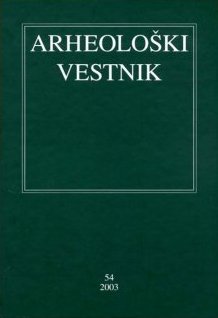The wooden handle of a stone hammer-axe from the Eneolithic pile-dwelling settlement Stare gmajne near Verd in the Ljubljansko barje, Slovenia
Abstract
A stone hammer-axe from the second half of the 4th mil-lennium BC was excavated at the pile dwelling Stare gmajne in the Ljubljansko barje, Slovenia. The axe had a preserved part of the wooden handle which is rare. Exact wood identifi-cation was important because the axe was made of imported stone that can not be found in Slovenia. We found out that the handle was made of cornel (Cornus sp.) that possibly grew in the vicinity of the pile dwelling. The cornel wood is hard, and has excellent mechanical properties including high impact strength; therefore it was an excellent material for the handle. This confirms that the prehistoric men had good knowledge of the wood properties. We discuss the importance of reference material (microscopic slides and samples of wood from modern trees and bushes) to differentiate the wood of cornel which has similar wood anatomy to that of boxwood (Buxus sempervirens). The boxwood as a Mediterranean species in prehistoric time supposedly did not grow in the vicinity of the pile dwelling where the axe was found.
Downloads
References
BRUS, R. 2005, Dendrologija za gozdarje. – Oddelek za goz-darstvo in obnovljive gozdne vire, Biotehniška fakulteta Univerze v Ljubljani.
CULIBERG, M. 1984, Karpološke in ksilotomske raziskave kolišča na Partih. Izkopavanja 1981. –Poročilo o raziskovanju paleolita, neolita in eneolita v Sloveniji 12, 91–100.
ČUFAR, K. 2006, Anatomija lesa. – Oddelek za lesarstvo, Biotehniška fakulteta Univerze v Ljubljani. ČUFAR, K. in M. ZUPANČIČ 1999, Determinacija lesa predmetov kulturne dediščine. – V: Les v restavratorstvuRES., Dela / Papers 4, 48–52, Ljubljana.
HORVAT, I. 1959, Dren (Drijen); Svib. – V: A. Ugrenović, Z. Potočić (ur.), Šumarska enciklopedija, A–Kos, 245, Zagreb.
JERAJ, M. 2004, Paleobotanične raziskave na kolišču Hočevarica. – V: A. Velušček (ur.), Hočevarica – eneolitsko kolišče na Ljubljanskem barju / Hočevarica – eneolithic pile dwelling in the Ljubljansko barje, Opera Instituti Archaeologici Slo-veniae 8, 56–64.
RICHTER, H. G. in M. J. DALLWITZ 2002, Commercial timbers: descriptions, illustrations, identification, and informa-tion retrieval. (Računalniški program – ključ za določanje komercialnih lesnih vrst INTKEY).
SCHWEINGRUBER, F. H. 1990, Mikroskopische Holzanato-mie. – Birmensdorf.
ŠERCELJ, A. in M. CULIBERG 1978, Ksilotomske analize lesa iz kolišča ob Maharskem prekopu – izkopavanja 1976 in 1977. –Poročilo o raziskovanju paleolita, neolita in eneolita v Sloveniji 6, 103–107.
TORELLI, N. 1991, Makroskopska in mikroskopska identifikacija lesa (ključi). – Oddelek za lesarstvo, Biotehniška fakulteta Univerze v Ljubljani.
VELUŠČEK, A. 2002, Ostanki eneolitskega voza z Ljubljanskega barja. –Arheološki vestnik 53, 51–57.
VELUŠČEK, A. 2004, Past and present lake-dwelling studies in Slovenia. Ljubljansko barje (the Ljubljana Marsh). – V: F. Menotti (ur.), Living on the lake in prehistoric Europe. 150 years of lake-dwelling research, 69–82, London, New York.
VELUŠČEK, A. 2005, Ljubljansko barje v koliščarski dobi. –V: I. Slavec Gradišnik, H. Ložar-Podlogar (ur.), Pretrgane korenine – sledi življenja in dela Rajka Ložarja, Opera ethno-logica Slovenica, 191–216.
VELUŠČEK, A., K. ČUFAR, M. CULIBERG, B. TOŠKAN, J. DIRJEC, V. MALEZ, F. JANŽEKOVIČ in M. GOVEDIČ 2004, Črešnja pri Bistri, novoodkrito kolišče na Ljubljanskem barju. –Arheološki vestnik 55, 39–54.
WRABER, T. 2001, Ali je pušpan (Buxus sempervirens) v Sloveniji avtohton? – V: Vegetacija Slovenije in sosednjih območij 2001, 64–66, Ljubljana.
ZUPANČIČ, M., A. JAZBEC in K. ČUFAR 2004. Analiza lesa in restavriranje baročnega kipa. Les 56/9, 283–286.
Downloads
Published
How to Cite
Issue
Section
License

This work is licensed under a Creative Commons Attribution-NonCommercial-ShareAlike 4.0 International License.
Authors guarantee that the work is their own original creation and does not infringe any statutory or common-law copyright or any proprietary right of any third party. In case of claims by third parties, authors commit their self to defend the interests of the publisher, and shall cover any potential costs.
More in: Submission chapter





